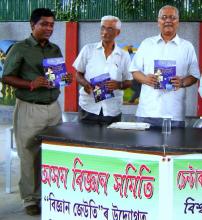Lewis Hamilton, an ace Formula one driver uses a battery of people and slew of technology to know the wind speed, tyre stress, fuel efficiency and fellow driver position to “WIN”. CEO’s of all companies rely on market information, financial performance among host of other indicators to determine the Organization’s performance. A postal delivery person relies on information on geographic presence of new addresses added in the locality and people who have newly occupied or vacated their houses.
What we have in common in all these examples are the usage of information to better performances and achieve the desired results. Imagine, Lewis Hamilton driving without knowing the tyre stress or wind speed or fuel status. Well, he will still drive but not “WIN”. He needs the information more than anyone else does.
Let us, overlay this to the programmes in Social Sector. The information is still very much centralised and third party based. The people at the forefront of the programme are collectors and couriers of data, while the Managers not only hold the information that is useful for them but also the information, which in true sense, is required by the people at front. The question is “How do we create a loop of data flow which provides information to the people who actually need it?” It is here that two distinct aspects emerge as game changer.
First, the change in attitude towards usage of information for effective delivery (remember that Spider Man and Cat Woman who knows all about the troubles, are only imaginary characters!). Second is the use of technology that breaks the barriers of speed and geography.
We at, Solidaridad’s South and South East Asia Region, have been rigorously pushing for both. The focus is on value creation and not being just a repository of data. Partnership in success and accountability for delivery is the mantra of engagement. The technology integration is much desired and but uptake is slower (relative to the speed at which we in the region intend) given the requirement of resources (most of the technologies still do cost quite a lot!) and integration of the same with the programme design. Inspite of this, here are some of the initiatives that we have started/planned:
Technology in Action:
1. Water meters that enables sending the water usage data recorded through SMS
2. Entrepreneurship development on Agricultural Innovations and Farm Mechanization
3. Water Stress assessment through GIS mapping
4. Demand generation and servicing through SMS based systems of Agricultural Technical Extension Services.
5. Private sector engagement on Agriculture Innovations such as Seafood Trade Intelligence Portal, a global web-based portal that provides products and services while shedding light on what happens in the supply chains and enable companies to find business partners that can meet their quality and sustainability requirements. It is designed to support buyers and suppliers to find matching business partners
Facilitating decision through Technology:
1. Data capture of farm practices and farmer information (pilot stage)
2. Geo tagging of farms (on sample basis in our Farmer Support Programme in Sugarcane)
3. Productivity Meters (Draft stage of development)
To augment our efforts, the Region looks at four strategic interventions in the near future (next 3 years) on technology:
1. A strategic view on technology integration specifically for water conservation and increasing agricultural productivity. This would include use of satellite imagery for crop planning and water efficiency improvements, breakthrough innovations on Climate resilient production practices for conserving the eco-system and sustainable landscape.
2. Decision driven by data by the people at all levels of the programme (this includes farmers). This shall be facilitated by data collation and analysis that is powered by cloud based technology solutions where every plot of land becomes the unit of intervention and analysis, which provides a dashboard that, is multi-stage and multi-level.
3. Tech enabled assurance model on Sustainability.
4. Empowering the people at all levels making them owners of the data to strategize, plan and act
Let’s just say, we don’t intend but we rigorously pursue a world which produces sustainably and is powered by a forceful combination of passion and technology.





Add new comment